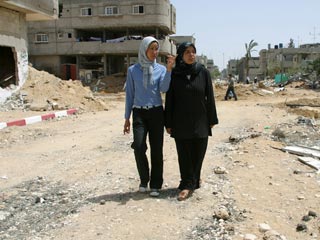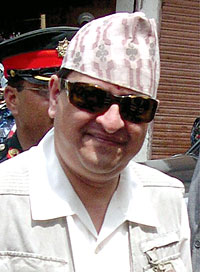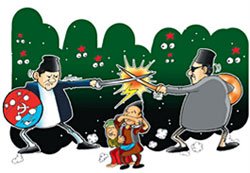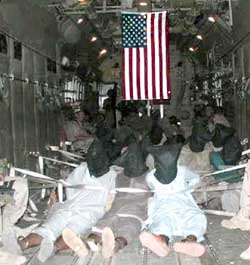 Nepal: Once again Today is February One: I am writing this post from Ottawa on 31st January, 2006 around 11.PM. It is already February One morning in Nepal. I remember last year on this morning I was in Pokhara in Nepal. We were having an workshop for women journalists from that region. Prime Minister Deuba was supposed to come to inagurate this event. He never came as he was put under house arrest on this morning. King went on television and radio to announce his historic "coup".
Nepal: Once again Today is February One: I am writing this post from Ottawa on 31st January, 2006 around 11.PM. It is already February One morning in Nepal. I remember last year on this morning I was in Pokhara in Nepal. We were having an workshop for women journalists from that region. Prime Minister Deuba was supposed to come to inagurate this event. He never came as he was put under house arrest on this morning. King went on television and radio to announce his historic "coup".Today, after one year, once again the King of Nepal is going to address the nation in few minutes. God knows waht he is going to say this time.
Kantipur Online reported today:
Royal announcement on Wednesday morning
Kantipur Report
KATHMANDU, Jan 31 - King Gyanendra is to address the nation at 9 a.m. on Wednesday morning, state-run Nepal Television said Tuesday evening.
The royal address which marks the completion of one-year direct rule by the King that began on February 1, 2005, will be aired on the state-run television at 9 a.m. tomorrow.
Assuming total executive power, the King on Feb.1, last year, dismissed the Sher Bahadur Deuba-led coalition government, suspended fundamental rights and declared a three-month state of emergency across the country.
He said that his move was essential to contain “escalating terrorism, as the successive governments in the past failed to counter it.”
The king also put almost all mainstream political leaders under house arrest or detention. Landline and mobile phone services and the Internet were shut down soon after the royal proclamation.
Security bodies ordered to arrest protestors
High-level sources said that a meeting of the central Security Council was held today morning to discuss the country’s current security situation. The meeting has reportedly directed security bodies to “arrest those who take out protest rallies tomorrow.”
Alliance to mark Feb 1 as “Black Day”
Meanwhile, issuing separate statements this evening, the agitating seven mainstream political parties criticized the one year of royal takeover and decided to mark Feb 1 as “Black Day.”
The alliance has decided to take out a protest rally from Teku, Kathmandu, burn the effigy of “regression” and demonstrate black flags tomorrow.
“The King’s move was in direct violation of the Constitution of Nepal achieved through the popular movement of 1990,” said Nepali Congress (NC), one of the largest political parties in the seven-party alliance, which has been launching protest demonstrations against the Feb.1 royal move.
The NC said, “This move of the king to seize absolute power through military force will ultimately prove detrimental to the monarchy itself.”
Issuing a statement CPN-UML General Secretary Madhav Kumar Nepal said that the the King’s Feb.1 move was aimed at “killing democracy and beginning his autocratic regime.”
"The King's words and deeds have proved that he was hatching a conspiracy to run a dictatorial rule right from the start by putting all blames on the political parties," Nepal said.
Nepali Congress-Democratic (NC-D) said, “During this period of autocratic rule, the country has been on a downward spiral not only politically and economically but from all aspects.”
The NC-D also said that the present government has been using the ongoing violent conflict in the country to extend its “autocratic rule.”
Terming the Feb.1 royal takeover as a “regressive move,” Nepal Majdoor Kisan Party today said the party would not stop its struggle unless the “regression” is corrected.
Authoritarian rule unsuccessful: US
Meanwhile, the United States has called the one year of direct rule by the King an “unsuccessful authoritarian rule.”
In a statement issued on Tuesday, the US Department of State said it remains troubled by the developments in Nepal, one year after the King seized power on February 1, 2005.
“Twelve months of palace rule have only made the security situation more precarious, emboldened the Maoist insurgents, and widened the division between the country's political parties and the King,” the statement said.
“The United States remains particularly concerned by the Maoist insurgency, which presents the most immediate threat to a peaceful and prosperous Nepal,” the statement said.
Urging the King to return to democracy by initiating a dialogue with the country’s political parties, the US also said after one year of “unsuccessful authoritarian rule,” this is the best way to address the Maoist insurgency and to build a brighter future for Nepal’s people.
AP also reported the following today:
KATHMANDU, Nepal (AP) -- On a cold morning one year ago the phones suddenly went dead in Nepal.
Heavily armed soldiers surrounded the homes of powerful politicians in the Himalayan country. Roadblocks went up in the streets.
The king had taken complete control.
King Gyanendra went on state-run television and radio last February 1 to say the move was necessary to bring sense to the nation's chaotic, corrupt political scene, and crush the Maoist insurgents who had seized control of much of the countryside.
But one year later, Nepal appears to be sliding deeper into crisis, with an autocratic king pitted against an unlikely coalition of fractious political parties and violent communist rebels.
Now, the monarch and the political parties seem on a collision course, with neither ready to give way.
The most recent conflict has arisen over the king's decision to push ahead with February 8 municipal elections, polls that Gyanendra says are the first step towards restoring democracy.
But in the past few weeks he has again clamped down on political freedom, thrown hundreds of politicians into jail, put others under house arrest and muzzled the media.
The parties, for their part, call the polls a sham and a way for Gyanendra to entrench his power. They're urging a boycott.
The Maoists, meanwhile, have threatened to take "severe action" against candidates and election workers. They're already accused of killing one candidate, wounding another and abducting a third.
Nepal has been in turmoil since Gyanendra assumed the crown in 2001 after his brother, King Birendra, was gunned down in a palace massacre apparently committed by Birendra's son, the crown prince, who also died.
Soon after Gyanendra became king, the Maoists intensified their attacks. Public disillusion grew with the politicians, who were seen as corrupt and only interested in keeping power.
Finally, a year ago, the king dismissed the government, accusing it of failing to hold parliamentary elections or end the insurgency.
But 12 months of royal dictatorship have widened the chasm between Gyanendra and the political parties, with leaders across Nepal's political spectrum arguing the king himself poses the biggest hurdle to democracy and a resolution to the decade-long insurgency that has killed more than 12,000 people.
Loyalists uncertain
"The root cause of the present situation is the king's intransigence. By refusing to hold a dialogue with the political parties and pushing ahead with these sham elections, the king has plunged the country into a crisis," said Ram Sharan Mahat, a senior leader of the Nepali Congress, the country's main political party, which ruled for 14 years before the king's takeover.
The king's actions, such as the clampdown on political activity and resorting to military offensives to deal with the Maoists, have even left many of his loyalists uncertain.
"The conflict cannot be won by mere military means," said Pashupati Shamsher J. B. Rana, once a royal confidant and head of the pro-royalist Rashtriya Prajatantra Party, or National Democratic Party.
"The ultimate solution is to bring the insurgents into the mainstream through a dialogue, in which ... the king and the parties engage jointly."
That is easier said than done.
The political parties insist the king must first restore the elected parliament and return to his position as constitutional monarch.
"We now have a single theme -- the king should go back to his constitutional role," says Surya Bahadur Thapa, a former prime minister and senior Nepali Congress leader.
Thapa says the king pushed the political parties into forging an alliance with the Maoist rebels.
"It was when the parties saw that the king would not heed them that they joined hands with the Maoists to jointly put pressure on the king," he said.
Opposition alliance
In November, an alliance of seven political parties and the Maoists agreed to a 12-point agenda to step up opposition to the king and restore democracy in Nepal.
However, the king has refused to negotiate with the parties and is determined to go ahead with municipal elections, despite an embarrassingly low candidate turnout. Candidates have registered in less than half the 4,146 election races for local offices in 58 cities and towns.
There is mounting anger on the streets of Kathmandu, where a shrinking economy and growing political unrest have increased the hardships of an impoverished populace.
Ranak Pandey, a Kathmandu shopkeeper, says words like democracy have little meaning when the lives of common people are shrouded in uncertainty because of protest rallies and strikes.
"People just want some order in their lives, some calm," says Pandey.
"Whoever can give us that, whether king or party or Maoist, is welcome."















